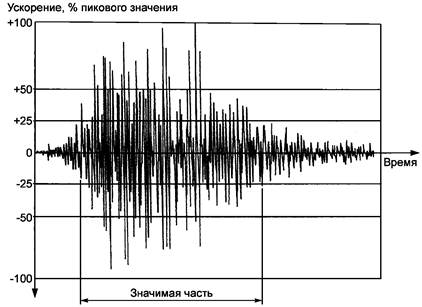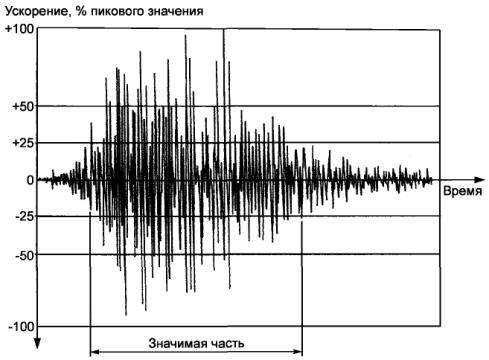-
1 значимая часть временного сигнала
3.22 значимая часть временного сигнала (strong part of the time-history): Участок временного сигнала между двумя моментами времени, когда сигнал в первый раз достигает уровня 25 % пикового значения и когда он в последний раз опускается ниже этого уровня (см. рисунок 4).

Рисунок 4 - Типичная форма временного сигнала возбуждения
Источник: ГОСТ 31418-2010: Методы испытаний на стойкость к механическим внешним воздействующим факторам машин, приборов и других технических изделий. Испытания на удар с воспроизведением ударного спектра оригинал документа
3.22 значимая часть временного сигнала (strong part of the time-history): Участок временного сигнала между двумя моментами времени, когда сигнал в первый раз достигает уровня 25 % пикового значения и когда он в последний раз опускается ниже этого уровня (см. рисунок 4).

Рисунок 4 - Типичная форма временного сигнала возбуждения
Источник: ГОСТ Р 53190-2008: Методы испытаний на стойкость к механическим внешним воздействующим факторам машин, приборов и других технических изделий. Испытания на удар с воспроизведением ударного спектра оригинал документа
Русско-английский словарь нормативно-технической терминологии > значимая часть временного сигнала
-
2 бог весть
I• БОГ <ГОСПОДЬ, АЛЛАХ> (ЕГО <тебя и т.п.> ЗНАЕТ < ВЕДАЕТ>; БОГ ВЕСТЬall coll[VPsubj; these forms only; usu. the main clause in a complex sent or indep. sent; fixed WO]=====⇒ no one knows, it is impossible (for s.o.) to know:- God <(the) Lord, heaven, goodness> (only) knows;- God alone knows.♦ "Кто же я таков, по твоему разумению?" - "Бог тебя знает; но кто бы ты ни был, ты шутишь опасную шутку" (Пушкин 2). "And who am I then, in your opinion?" "God only knows; but whoever you may be, you're playing a dangerous game" (2a).♦...Он ездит и в свет, и читает: когда он успевает - бог весть (Гончаров 1)....There was his social life and his reading-heaven only knows how he found the time! (1b).♦ Родители его были дворяне, но столбовые или личные - бог ведает (Гоголь 3). God alone knows whether his parents, who were of the nobility, were so by descent or personal merit (3d).II[VPsubj; these forms only; fixed WO]=====1. [usu. the main clause in a complex sent; when foll. by an Adv, may be used as adv]⇒ no one knows (who, what, how etc):- God <(the) Lord, heaven, goodness> (only) knows (who <what, how etc>).♦ Выкопали всё, разузнали его [Чичикова] прежнюю историю. Бог весть, откуда всё это пронюхали... (Гоголь 3). Everything was dug up and all the past history of his [Chichikov's] life became known. God only knows how they got on the scent of it... (3a).♦ Бог весть, почему нервничали встречавшие (Свирский 1). Heaven knows why the reception party should have been so nervous (1a).♦ Дом Обломовых был когда-то богат и знаменит в своей стороне, но потом, бог знает отчего, всё беднел, мельчал... (Гончаров 1). The Oblomov family had once been rich and famous in its part of the country, but afterwards, goodness only knows why, it had grown poorer, lost all its influence... (1a).2. [used as NP (when foll. by кто, что), AdjP (when foll. by какой), or AdvP (when foll. by где, куда etc)]⇒ used to express a strong emotional reaction-anger, indignation, bewilderment etc:- God <(the) Lord, heaven, goodness> (only) knows (who <what, how etc>)!;- what sort < kind> of (a) [NP] is he (she, that etc)!;- [in limited contexts;- said with ironic intonation] some [NP] (I must say)!♦ "Да ведь она тоже мне двоюродная тётка". - "Она вам тётка ещё бог знает какая: с мужниной стороны..." (Гоголь 3). "But, you know, she is a cousin of mine." "What sort of a cousin is she to you...only on your husband's side..." (3d).Большой русско-английский фразеологический словарь > бог весть
-
3 бог знает
I[VPsubj; these forms only; usu. the main clause in a complex sent or indep. sent; fixed WO]=====⇒ no one knows, it is impossible (for s.o.) to know:- God <(the) Lord, heaven, goodness> (only) knows;- God alone knows.♦ "Кто же я таков, по твоему разумению?" - "Бог тебя знает; но кто бы ты ни был, ты шутишь опасную шутку" (Пушкин 2). "And who am I then, in your opinion?" "God only knows; but whoever you may be, you're playing a dangerous game" (2a).♦...Он ездит и в свет, и читает: когда он успевает - бог весть (Гончаров 1)....There was his social life and his reading-heaven only knows how he found the time! (1b).♦ Родители его были дворяне, но столбовые или личные - бог ведает (Гоголь 3). God alone knows whether his parents, who were of the nobility, were so by descent or personal merit (3d).II[VPsubj; these forms only; fixed WO]=====1. [usu. the main clause in a complex sent; when foll. by an Adv, may be used as adv]⇒ no one knows (who, what, how etc):- God <(the) Lord, heaven, goodness> (only) knows (who <what, how etc>).♦ Выкопали всё, разузнали его [Чичикова] прежнюю историю. Бог весть, откуда всё это пронюхали... (Гоголь 3). Everything was dug up and all the past history of his [Chichikov's] life became known. God only knows how they got on the scent of it... (3a).♦ Бог весть, почему нервничали встречавшие (Свирский 1). Heaven knows why the reception party should have been so nervous (1a).♦ Дом Обломовых был когда-то богат и знаменит в своей стороне, но потом, бог знает отчего, всё беднел, мельчал... (Гончаров 1). The Oblomov family had once been rich and famous in its part of the country, but afterwards, goodness only knows why, it had grown poorer, lost all its influence... (1a).2. [used as NP (when foll. by кто, что), AdjP (when foll. by какой), or AdvP (when foll. by где, куда etc)]⇒ used to express a strong emotional reaction-anger, indignation, bewilderment etc:- God <(the) Lord, heaven, goodness> (only) knows (who <what, how etc>)!;- what sort < kind> of (a) [NP] is he (she, that etc)!;- [in limited contexts;- said with ironic intonation] some [NP] (I must say)!♦ "Да ведь она тоже мне двоюродная тётка". - "Она вам тётка ещё бог знает какая: с мужниной стороны..." (Гоголь 3). "But, you know, she is a cousin of mine." "What sort of a cousin is she to you...only on your husband's side..." (3d).Большой русско-английский фразеологический словарь > бог знает
См. также в других словарях:
History of Fiji — This article is part of a series Early history … Wikipedia
History of the Kurdish people — This article is part of the Kurdish history and Culture series Ancient history Corduene Kayusid Medieval history Shahrazur Shaddadid Rawadid Hasanwayhid Annazid Marwanid Hadhabani Hazaraspid Ayyubid Badlis Ardalan … Wikipedia
History of Sussex — Prehistoric Sussex= Archaeological collections contain a neanderthal handaxe, found at Hamsey near Lewes, dated to perhaps 80,000 years ago.Later archaeological finds have shown that Mesolithic peoples had arrived in the area today known as… … Wikipedia
History of the Communist Party of the Soviet Union — Communist Party of the Soviet Union History Organisation … Wikipedia
The Alarm — For the 1914 film starring Fatty Arbuckle, see The Alarm (film). The Alarm The Alarm, 1984. Background information Also known as … Wikipedia
The Flats — For the film, see The Flats (film). The Cuyahoga River and the industrial flats. The Flats is a mixed use industrial, entertainment, and increasingly residential area of Cleveland, Ohio, USA. The name reflects its low lying topography on the… … Wikipedia
History of Chechnya — The History of Chechnya refers to the history of Chechens, Chechnya, and the land of Ichkeria. Chechen society has traditionally been organized around many autonomous local clans, called taips. The traditional Chechen saying goes that the members … Wikipedia
History of Japan — Paleolithic 35,000–14,000 BC Jōmon period 14,000–300 BC Yayoi period 300 BC–250 AD Kofun period … Wikipedia
History of Hungary — This article is part of a series Prehistory … Wikipedia
History of Ghana — The Republic of Ghana is named after the medieval West African Ghana Empire,[1] known to the dominant ethnic group the Soninke, as Wagadugu, which roughly translates to Land of Herds. The Empire became known in Europe and Arabia as the Ghana… … Wikipedia
History of Missouri — The history of Missouri begins with France claiming the territory and selling it to the U.S. in 1803. Statehood came following a compromise in 1820. Missouri grew rapidly until the Civil War, which saw numerous small battles and control by the… … Wikipedia
